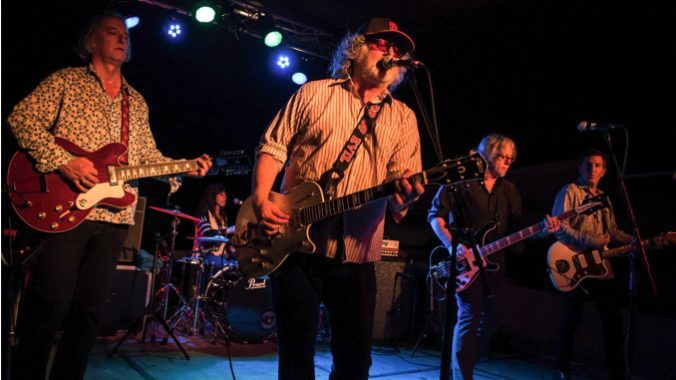Baseball: New Rules, New Stars, New Songs
A Curmudgeon Column
Photo of the Baseball Project by Chris Sikich, courtesy of Sacks & Co. From left: Peter Buck, Linda Pitmon, Scott McCaughey, Mike Mills and Steve Wynn
Baseball seemed to reinvent itself in 2023. There were new rules, new stars, new teams on top and new teams on the bottom. And there were new songs, thanks to Grand Salami Time!, a new album from the Baseball Project.
Baseball inspires more and better songs than any other sport, but just as the game needs a new crop of rookies, it also needs a new crop of tunes each season. This year has yielded such remarkable rookies as the Arizona Diamondbacks’ Corbin Carroll, the Baltimore Orioles’ Gunnar Henderson, the Cincinnati Reds’ Elly de la Cruz and the Texas Rangers’ Josh Jung. Not surprisingly, those four teams find themselves in contention for the playoffs after long droughts as bottom feeders. Meanwhile, perennial contenders such as the New York Yankees, New York Mets and St. Louis Cardinals find themselves looking up from the bottom of the standings.
The season has also produced such smart songs as “The Yips,” “Journeyman,” “The All or Nothings,” all from Grand Salami Time! This is the fourth album of all-original baseball songs from the Baseball Project, but the first in nine years. The group sprang from a shared passion for baseball by Scott McCaughey and Steve Wynn; McCaughey recruited his R.E.M. tourmates Peter Buck and Mike Mills; Wynn brought along his drummer Linda Pitmon. Original R.E.M. producer Mitch Easter produced this new album from the manager’s corner of the dugout.
“More than any other team sport,” Wynn says, “baseball is a game that highlights individual achievement. Put a great player on a crappy football, basketball or soccer team, and he’s gonna have trouble. But when you’re in the batter’s box or on the pitcher’s mound, it is mano a mano; it’s High Noon; it’s Frazier vs. Ali. I mean, that Trout vs. Ohtani moment that ended the World Baseball Classic last March could be an entire movie right there.”
“I think the slower pace of baseball attracts the artist, slacker and dreamer,” adds McCaughey. “It’s almost like it can be appreciated by fans who don’t necessarily worship sports per se. There’s a pastoral angle that you don’t get in the frenzy of some of the faster sports.”
Wynn and McCaughey aren’t the only ones creating cool baseball songs in the 21st century. Folk-punk singer/songwriter Dan Bern released Doubleheader, a terrific compilation of his own baseball songs, in 2012, and he continues to pen new ones for The Tony Kornheiser Show on Apple Podcasts. Such Bern numbers as “The Golden Voice of Vince Scully,” “Sunday Never Comes” and “Seven Miles an Hour” are gems of the genre.
“The pace of the game lends itself to literary activity,” says Bern. “You can watch a game and have these moments of respite to reflect on what’s happening. Even before there were baseball songs, there were baseball stories by Ring Lardner and the like. If I go to a baseball game, I’m more likely to come back with a song than if I go to a football game or a basketball game. The pauses are built in.”
Like many of us, Bern was worried about the new rules added to the game this year, especially the addition of a pitch clock. He had relished the fact that baseball was the only team sport without a clock. But he was surprised by how painless the transition has been. Once everyone adjusted to the ticking, 20-second countdown, they forgot about it, and the game resumed the relaxed, steady pace of the ’50s and ’60s. The games moved along better, but the pauses were still there, providing plenty of time for reflection on what just happened and for anticipation of what might happen next.
“The new rules are the best thing to happen to the game in decades,” agrees Wynn. “Did you know that attendance is up 10% overall this year across the board? That’s great. I think a game that was quickly approaching irrelevance did itself a great favor—hey, it probably helped us as well when you think of it. Having said that, I hate, hate, hate the extra-inning ghost runner and hope it goes away soon.”
The true baseball fan resists radical rule changes, because one doesn’t want one era of the game to be too different from the others; one wants to be able to make comparisons across history. Shohei Otani’s season this year—at least before he blew out his elbow—was fascinating precisely because one had to reach back to Babe Ruth’s early career with the Boston Red Sox for such a combination of high-caliber pitching and high-caliber hitting from the same player. You had to reach back to Ted Williams when Luis Arraez was flirting with a .400 batting average. Ronald Acuna Jr.’s combination of power and speed prompted memories of pre-PED Barry Bonds.
“The history is important,” Wynn argues. “Baseball’s been in the spotlight far longer than other sports. When you can draw a line from Ty Cobb and Babe Ruth to Reggie Jackson and Pete Rose and beyond, you’ve got great movies, great books or, hopefully in our case, great songs.”
-

-

-

-

-

-

-

-

-

-

-

-

-

-

-

-

-

-

-

-

-

-

-

-

-

-

-

-

-

-

-

-

-

-

-

-

-

-

-

-








































